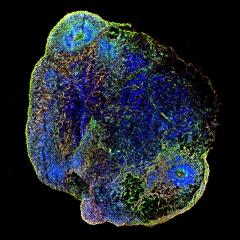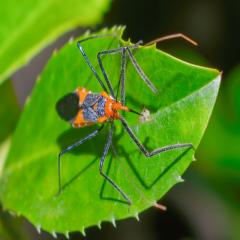Nervous system disorders, like pain, epilepsy, and stroke remain some of the world’s most serious health problems. Pain is prolific. Chronic pain is the biggest unresolved medical condition in the world. Stroke is the second leading cause of death and the leading cause of morbidity.
Epilepsy, stroke, and pain have two significant things in common. First, an overactive or mutated ion channel influences the disease, and second, there are no good treatments to address them. Our group hopes to change that.
We are exploring the venoms of spiders, centipedes, and scorpions to find novel peptides that can inhibit or activate ion channels. These have potential to become drugs for nervous system disorders.
Group leader

Professor Glenn King
Group Leader, Bugs and drugs
+61 7 3346 2025
glenn.king@imb.uq.edu.au
UQ Experts Profile
Spider venoms are predicted to contain more than 10 million different bioactive peptides. Venoms have evolved to target the nervous systems of their prey, and neurotoxic venoms are also highly targeted within the human body, which makes them excellent drug candidates.
We have discovered molecules within venom that modulate ion channels, a very promising discovery that may be effective against epilepsy is entering clinical trials soon.
We have also applied our expertise in venom-derived peptide chemistry to create an eco-friendly bio-insecticide. It was a significant discovery that charted new territory in the field.
We have developed a discovery pipeline that allows us to obtain venom peptide structures and structure-activity relationship data at an unprecedented rate,.
The Institute for Molecular Bioscience is the leading institute for venom-based drug discovery in the world. It has the biggest collection of venoms, with more than 600 in the library.
Research title: Bugs and drugs
Summary of research interests: Animal venoms are increasingly being used in drug discovery efforts as they constitute a vast and largely untapped source of pharmacologically active molecules. Spiders are by far the most successful group of venomous animals and their venoms are predicted to contain more than 10 million different bioactive peptides. Our group is exploring spider venoms as a source of novel peptides to provide leads for the development of new drugs and insecticides. As a major part of this initiative, we have developed a discovery pipeline that allows venom peptide structures and structure-activity relationship data to be obtained at an unprecedented rate.
Traineeships, honours and PhD projects include
- Discovery and characterisation of venom peptides targeted at ion channels involved in sensing or transmission of pain
- Discovery and characterisation of novel insecticidal and nematicidal compounds
- Structural characterisation of the interaction between venom peptides and their ion channel targets
- Examination of the genetic basis underlying the remarkable diversity and evolution of venom peptides.
Spider-venom peptides: structure, pharmacology, and potential for control of insect pests
King, Glenn F. and Hardy, Margaret C. (2013) Spider-venom peptides: structure, pharmacology, and potential for control of insect pests. Annual Review of Entomology, 58 475-496. doi:10.1146/annurev-ento-120811-153650
Venoms as a platform for human drugs: Translating toxins into therapeutics
King, Glenn F. (2011) Venoms as a platform for human drugs: Translating toxins into therapeutics. Expert Opinion on Biological Therapy, 11 11: 1469-1484. doi:10.1517/14712598.2011.621940
Smith, Jennifer J., Hill, Justine M., Little, Michelle J., Nicholson, Graham M., King, Glenn F. and Alewood, Paul F. (2011) Unique scorpion toxin with a putative ancestral fold provides insight into evolution of the inhibitor cystine knot motif. Proceedings of the National Academy of Sciences of the United States of America, 108 26: 10478-10483. doi:10.1073/pnas.1103501108
Ghai, Rajesh, Mobli, Mehdi, Norwood, Suzanne J., Bugarcic, Andrea, Teasdale, Rohan D., King, Glenn F. and Collins, Brett M. (2011) Phox homology band 4.1/ezrin/radixin/moesin-like proteins function as molecular scaffolds that interact with cargo receptors and Ras GTPases. Proceedings of the National Academy of Sciences of the United States of America, 108 19: 7763-7768. doi:10.1073/pnas.1017110108
The structural basis for autonomous dimerization of the pre-T-cell antigen receptor
Pang, Siew Siew, Berry, Richard, Chen, Zhenjun, Kjer-Nielsen, Lars, Perugini, Matthew A., King, Glenn F., Wang, Christina, Chew, Sock Hui, La Gruta, Nicole L., Williams, Neil K., Beddoe, Travis, Tiganis, Tony, Cowieson, Nathan P., Godfrey, Dale I., Purcell, Anthony W., Wilce, Matthew C. J., McCluskey, James and Rossjohn, Jamie (2010) The structural basis for autonomous dimerization of the pre-T-cell antigen receptor. Nature, 467 7317: 844-848. doi:10.1038/nature09448
Direct Visualization of Disulfide Bonds through Diselenide Proxies Using Se-77 NMR Spectroscopy
Mobli, M., Dantas de Araujo, A., Lambert, L. K., Pierens, G. K., Windley, M. J., Nicholson, G. M., Alewood, P. F. and King, G. E. (2009) Direct Visualization of Disulfide Bonds through Diselenide Proxies Using Se-77 NMR Spectroscopy.Angewandte Chemie International Edition, 48 49: 9312-9314. doi:10.1002/anie.200905206
Latest news
-
-
Developing venom-based epilepsy drugs using lab-grown organs
25 September 2024 -
Using an assassin to hunt for insecticides
4 September 2024
General enquiries
+61 7 3346 2222
imb@imb.uq.edu.au
Media enquiries
IMB fully supports UQ's Reconciliation Action Plan and is implementing actions within our institute.
Support us
Donate to research
100% of donations go to the cause

















